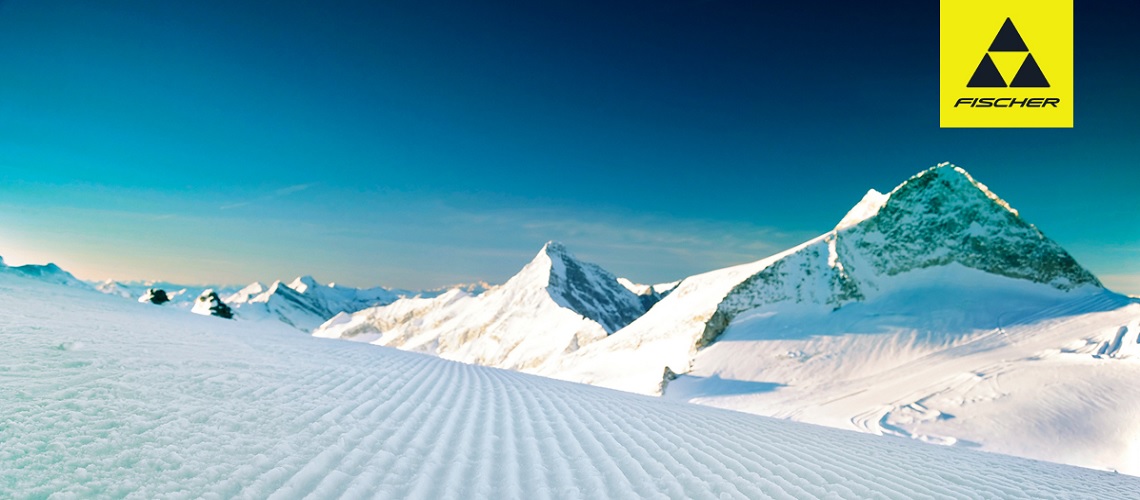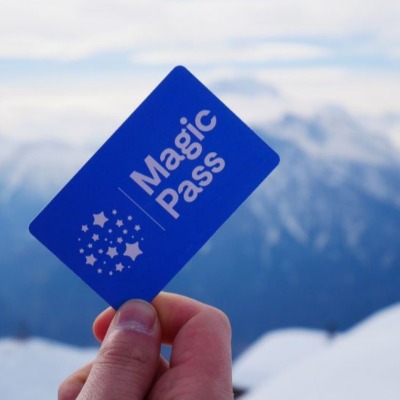Windy Games For The Fischer Race Family In Pyeongchang

The Winter Olympic Games in PyeongChang are over and all races have been completed - despite numerous postponements due to strong winds. Regrettably for the athletes of the Fischer Race Family, things did not go to plan in the individual events and the medals the racers were aiming for were missed at times by a hair's breadth. In the ten individual men's and women's races Fischer had nine top-10 places overall and finally celebrated gold at the end of the Games.
Daniel Yule clinches gold in team event
It was Slalom ace Daniel Yule who achieved the golden result for Fischer on the penultimate day of the Olympic Games in the team event, which was held for the first time. Yule joined forces with Ramon Zenhäusern and female team colleagues Wendy Holdener and Denise Feierabend to form a quartet which proved to be unbeatable on the day. Yule won three of his four runs just a few days after his 25th birthday and secured the gold medal for the Swiss team as the last racer in the final against Austria.
Johanna Schnarf misses bronze by 5/100
Unfortunately things did not go to plan for the athletes of the Fischer racing team in the individual races in PyeongChang. Johanna Schnarf came closest to a medal in the turbulent women's Super G. After a dramatic finish to the thrilling race a mere 5/100ths of a second separated the Italian from bronze. Schnarf had even taken the lead in the last split time some 20 seconds away from the finish line.
Experienced racer Thomas Fanara also finished in the thankless fifth Olympic place in the men's Giant Slalom but the podium would have certainly been within reach for him with a perfect second run.
There had been high hopes for the Fischer Slalom armada but they finally had to settle for 7th to 9th places in the end, with surprise racer Kristoffer Jakobsen, Daniel Yule and Dave Ryding. In fourth place after the first run, Manfred Mölgg dropped to twelfth in the second.
The speed specialists of the Fischer Race Family
Fischer's speed specialists were also plagued by bad luck at the Winter Games. After strong performances in training, Vincent Kriechmayr demonstrated his class with 6th in the Super G and 7th in the Downhill, with minor errors in both races preventing him from claiming a medal. "It wasn't enough from me. I'm not 100% happy," said the self-critical Upper Austrian.
In the women's camp Ramona Siebenhofer was constantly among the fastest in the Downhill training and succeeded in the internal Austrian Ski Federation qualification. In the race itself the Styrian racer was unfortunately unable to step up another gear and finished tenth. She then finished seventh in the Combined, where she was also the best Austrian racer.
Unlucky Brennsteiner suffers injury on the way to a medal
Fischer athlete Stefan Brennsteiner had extremely bad luck in the men's Giant Slalom. After a reasonable first run (14th) the Salzburg racer put in a truly dream performance in the second and was heading clearly for a medal with a lead of 1sec20 until the third split time. Shortly after, he caught a gate, fell heavily and tore a ligament in his right knee.
"It is of course very bitter. What happened to me shows you how close everything is," said the 26-year-old. “In the end you end up having a surgery instead of a top result.”
The series of injuries unfortunately appears to be relentless this winter for the Fischer Team. Prior to Brennsteiner in PyeongChang, experienced racer Philipp Schörghofer, Giant Slalom runner-up world champion Roland Leitinger and speed ace Steven Nyman were all out through injury.
With her convincing victory in the closing 30km race at the Olympic Games in PyeongChang (KOR) Marit Björgen (NOR)** not only left her mark but also provided the golden crowning glory of the extremely successful Winter Games for the Fischer Race Family at the same time. 56% of all the Nordic medals were won on Fischer skis, 48% of the athletes on the podium placed their trust in Fischer boots and 77% of all medallists achieved their success with the TURNAMIC® binding set-up. This has earned Fischer a place in the history books as the most successful ski, boot and binding brand.
"My goal is clear: I want to win gold in the 30km," explained Marit Björgen with a glint in her eye before the closing race. The "Iron Lady" of cross-country skiing went on to achieve her goal in convincing style and claim this gold as the Games in the Far East drew to a close. At the same time, the best cross-country skier of the past 15 years broke all records with her previous gold and silver plus two bronze medals and is now in the history books as the most successful Olympic athlete of all time, winning a total of 15 medals with eight of them in gold. Her team colleague Ragnhild Haga (NOR)** drew inspiration from her role model and had a golden Olympic debut with victory in both the 10km freestyle and in the relay. The Swedish ladies also made a significant contribution to the successful medals tally: Charlotte Kalla (SWE)* led the way at the start with victory in the skiathlon followed by three silver medals, while Stina Nilsson (SWE)* clinched gold in the sprint event and subsequently likewise two silver medals plus one bronze. Kikkan Randall (USA)** captivated an entire nation in her final Olympic race with victory in the team sprint, together with Jessica Diggins (USA).
In the men's events it was Johannes Hoesflot Klaebo (NOR)** who left his mark on these Games with his refreshing character, special skiing style and three gold medals. The young Norwegian star decided not to compete in the final 50km race with the following explanation: "It's enough for my first Olympic Games – it hasn't settled in yet." His team colleague Martin Johnsrud Sundby's (NOR)** declared goal of winning an individual gold medal may have been elusive but with two gold medals and one silver he played a major role in the success of his team. The same can be said of Denis Spitsov**, representing Olympic Athletes from Russia, with two silver medals and one bronze. Dario Cologna (SUI)** earned another entry in the history books as the first person to win the same distance (15km) in three consecutive Olympic Games. "It was very hard work and I desperately wanted to win like in Vancouver and Sochi. Writing a little bit of history isn't that bad," said the overall four-time Olympic champion in his familiar matter-of-fact style.
In the Nordic combined we witnessed a show of force in black, red and gold – or should it be black and yellow? All of the gold medals went to German athletes with Fischer skis and boots. The individual Olympic champions on both the small and the large hill, Eric Frenzel and Johannes Rydzek (both GER)**, joined forces with Vinzenz Geiger and Fabian Riessle (both GER)** in the final team event and left the other competitors with no chance. Eric Frenzel on behalf of the team: "Standing on the top of the podium at the Olympics is in itself an amazing feeling - but as part of such a team, it is simply outstanding."
In ski jumping Andreas Wellinger (GER)* made it to the podium in all three events. His first individual Olympic gold on the small hill was followed by two silver medals on the large hill and in the team event. "If someone had said to me that I was going to win three medals I would have replied: Nice dream!" said the keenest medal hunter among the Fischer eagles, overwhelmed. Kamil Stoch (POL)* repeated his triumph of Sochi and clinched Olympic victory on the large hill, plus bronze in the team event. In the women's jumping Maren Lundby (NOR)* won gold in impressive style ahead of Katharina Althaus (GER)*.
In biathlon Laura Dahlmeier (GER)** started out with two Olympic victories in sprint and pursuit in the races in PyeongChang and went on to take bronze in the individual event. "I used to dream of winning at the Olympics when I was a little girl and would practice celebrating victory on my bunk bed. And now something really big has come true," said the double Olympic champion. With gold in the mass start and silver in both pursuit and individual, Anastasiya Kuzmina's (SVK)** name likewise appeared on the medal lists three times. After some difficulties to begin with on the shooting range, Darya Domracheva (BLR)** appeared to be unleashed after her silver medal in the mass start and celebrated the surprising gold medal with her team colleagues Nadezhda Skardino**, Iryna Kryuko* and Dzinara Alimbekava** (all BLR) in the relay with sheer joy. Hanna Öberg (SWE)** provided another much deserved surprise with her Olympic victory in the individual which was followed by a silver medal in the relay.
In the men's events it was Johannes Thingnes Boe (NOR)** who went into the races with outstanding form. The Norwegian clinched victory in the individual event and went on to win silver in both the mixed relay and the men's relay. With gold at the beginning in the sprint and bronze in the relay, Arnd Peiffer (GER)* likewise played a considerable part in the positive medal results of the Fischer athletes.
Some 250 athletes competed in the Nordic disciplines in PyeongChang with Fischer. A total of 89 medals (35 x gold, 33 x silver and 21 x bronze) went to athletes of the Fischer Race Family. In cross-country, biathlon and Nordic combined, 14 Olympic champions placed their trust in Fischer in the 18 individual events. 56% of all Nordic medals were won on Fischer skis and 48% with Fischer boots. The TURNAMIC® binding set-up had a convincing Olympic debut with 77% of all medallists. It can be said that Fischer dominated the Games in PyeongChang as the most successful ski, boot and binding brand.
* Fischer skis ** Fischer skis and boots













